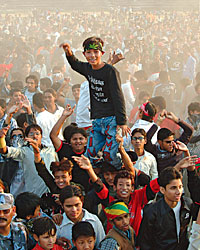 Reading Nepali newspapers quickly becomes a depressing exercise. Who wants to wake up each morning to learn about the killings, the arrests, the mass rallies, the curfews and the political stalemate?
Reading Nepali newspapers quickly becomes a depressing exercise. Who wants to wake up each morning to learn about the killings, the arrests, the mass rallies, the curfews and the political stalemate?
The media report as though a few Nepalis-the king, the political neta and the Maoists-have the power to change the fate of 25 million Nepalis. But what if there are forces far stronger than any one side's show of muscle, brewing in and around Nepal? What if the effects wrought by those forces will radically change Nepal from the path on which it's been muddling along since 1769? Regardless of who governs it, the forces that are going to change Nepal in the next 20 years are demography, geography and globalisation.
Demography: Nepal, the oldest country in South Asia, has a population with a median age of a mere 20 years. That figure is slightly higher than that for military-run Pakistan and the single-party-run Maldives. On one hand, such a low median age presents an opportunity. With good governance that represents people's aspirations, millions of young Nepalis can easily be inoculated against diseases and sent to school to pick up knowledge and skills to be productive citizens later on. Similarly, through incentive-driven policies for infrastructure development and improvement in service deliveries, millions more can be lifted out of poverty within our lifetime.
But in the face of continuingly draining political fencing that favours one group of people over many, the same young people-like their counterparts in Eastern Europe in the late 1980s-could well grow up to form cohorts that, through their sheer number, throw out any oppressive regime that slams a door on their dreams for a better future. For Nepal, it's not history but demography that is destiny.
Geography: The biggest story of our generation is going to be the unfolding of China and India as prosperously self-confident giants on the world stage. Only 15 years ago, those neighbours were mere footnotes that wielded little global influence.
In 1991, cash-strapped India had no choice but to shrug off decades of socialist policies to light the fuse of economic reforms, the pace of which is only going to go faster in coming years. Likewise, at the grand old age of 87 in 1992, communist leader Deng Xiaoping visited southern China and blessed bolder market reforms.
Since then, Chinese economic growth rates have been so astoundingly high that today every developed nation has its own strategy to benefit from China's economy. But at war with one another since 1996, we remain unable to come up with any coherent, much less credible, plan to take advantage of what's spinning on either side of us.
Globalisation: In Panchayat days, Radio Nepal would tell us that the world loved us and we believed it. These days, Nepalis get their news from so many sources that they are able to decide the truth of what they see, hear and experience without anybody's telling them what's what. Meantime, with a stronger remittance economy, lower information-gathering costs and the further fall of barriers to interconnect markets, global Nepalis and friends of Nepal have emerged with a louder voice about how this country should or should not be governed.
All these are slowly transforming Nepal from being in a state of trance over its history to a state of spasms about its future possibilities. That is why these unstoppable changes need to be taken seriously by all. After all, as Charles Darwin put it, it's not the strongest of the species that survives, nor is it the most intelligent but the one most responsive to change.
PIC: ANUP PRAKASH



